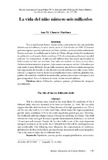La vida del niño número seis millardos

View/
Date
2008-12-31Author
Palabras Clave
Población, Pobreza, Género, Globalización desigualPopulation, Poverty, Gender, Unequal globalization, Uncertainty
Metadata
Show full item recordAbstract
Ésta es una historia fi cticia, basada en las condiciones de vida más probables
del niño seis mil millones, el cual se estima, nació el 12 de Octubre de 1999. Fácilmente
podemos suponer que éste niño nació en China, debido a su alta densidad poblacional.
Éste no es el caso. La verdad es que la India, no China, alberga el más alto crecimiento
de población en el mundo. India contribuye 21% al crecimiento poblacional mundial
cada año. En consecuencia, el niño seis mil millones tiene una mayor oportunidad de
haber nacido en India, no en China. Éste niño será también un chico, no una chica.
Debido a la discriminación de género, India cuenta con una sex ratio de 1.1 hombres por
cada mujer. A pesar del hecho de que India representa una de las economías emergentes
más importantes del mundo, la vida del niño seis mil millones será todo, menos fácil y
cómoda. La siguiente historia ilustra las contradicciones entre tradición, globalización,
políticas de control de natalidad, incertidumbre, pobreza, inversiones extranjeras y una
gran desigualdad. Ésta es la historia de Amit, el niño seis mil millones.
Collections
Información Adicional
| Otros Títulos | The life of the six billionth child |
| Editor | SABER-ULA |
| ISSN | 0798-9881 |
| Resumen en otro Idioma | This is a fi ctitious story, based on the most likely life conditions of the 6 billionth child, who was estimated to be born on October 12, 1999. We can easily suppose that this child was born in China, because of its high population rate. This is not the case, the truth is, it is India, not China, which houses the highest population growth. India contributes 21% to the world population growth per year. Therefore, the 6 billionth child has a higher chance of being born in India, not China. This child will also be a boy, not a girl. Because of gender discrimination, India has a sex ratio of 1.1 men per each woman. Despite the fact that India is one of the most important emergent economies in the world, the 6 billionth boy’s life will be anything but easy and comfortable. The following story illustrates the contradictions of traditions, globalization, birth control policies, poverty, foreign investments and a great inequality. This is the story of Amit, the six billionth child. |
| Colación | 137-146 |
| Periodicidad | semestral |
| País | Venezuela |
| Publicación Electrónica | Revista Venezolana de Ciencia Política |
| Sección | Revista Venezolana de Ciencia Política: Artículos |





